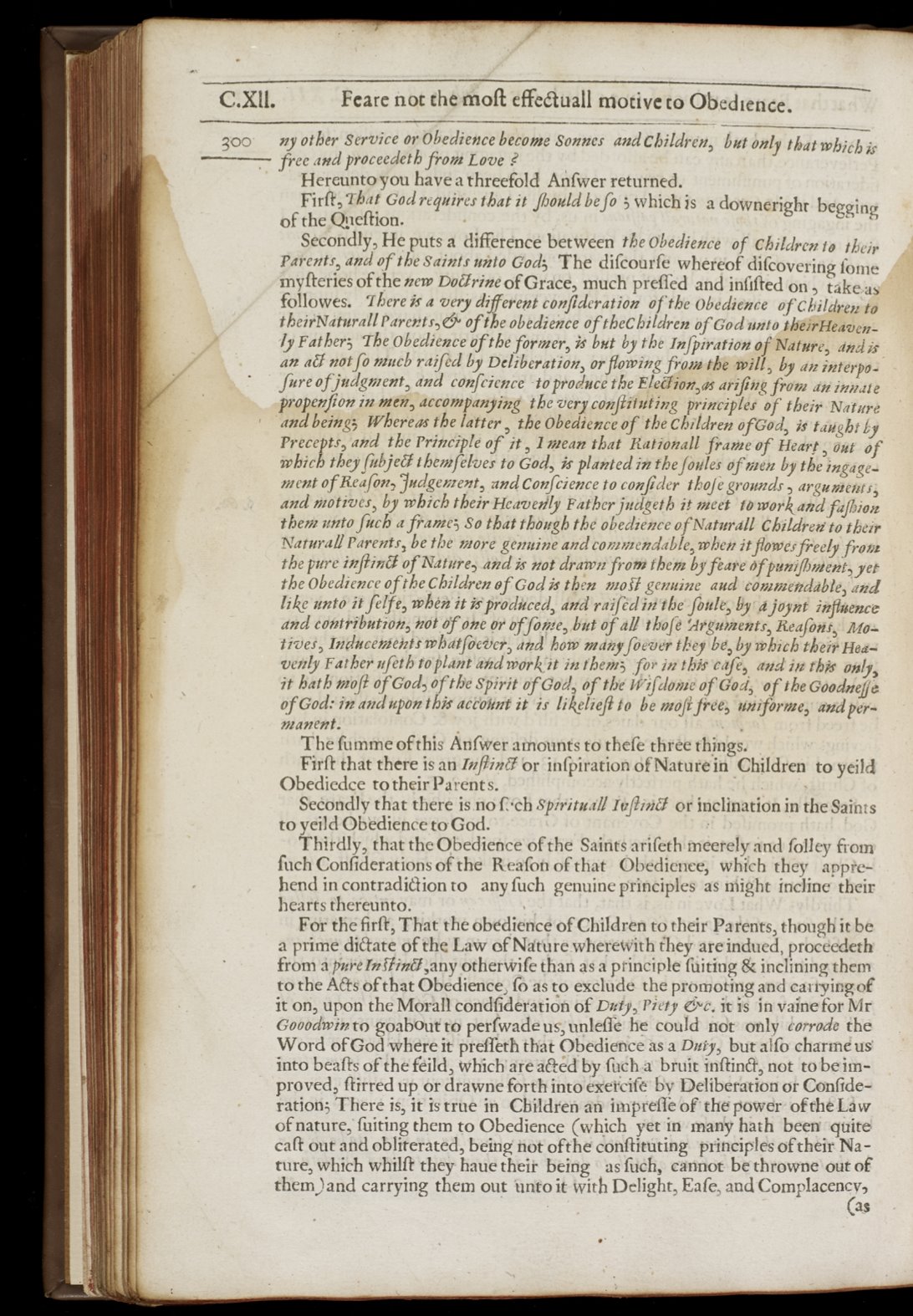

C.XII.
Feare
not
the
molt
effettuall motive
to Obedience.
300
ny
other Service or
Öbedience
become
Sonnes
andChildren,
but
only
that
which
h
free and
proceedeth
from
Love
?
Hereunto
you have
a
threefold
Anfwer
returned.
Firft,
That
God
requires
that it
fhould
be
fo
;
which
is
a downeright
begging
of
the
Qhieftion.
Secondly,
He puts
a
difference
between
the
Obedience
of
Children
to
their
Parents, and
of
the Saints
unto God;
The
difcourfe
whereof
difcovering fome
myfteries
of
the
new
Dotlrineof
Grace, much
preffed
and
infifted on
, take,as
followes.
There
is
a very
different confederation
ofthe
Obedience
of
children
to
theirNaturall
Parents,
&
of
the
obedience
of
theChildren
of
God unto
theirHeaven-
¡y
Father;
TheObedience
oftheformer,
is
but
by
the
lnfpiration
of
Nature, and
is
an
aü
not
fo
much
raifed
by
Deliberation, orflowing
from
the
will,
by
an
interpo-
fore
of
judgment, and
confcience
to produce the Eletlion,as arifing
from an innate
propenfion
in
men, accompanying the very
con,
flit
uting
principles
of
their
Nature
and
beings Whereas
the
latter,
the
Obedience
of
the
children
ofGod,
is
taught
by
Precepts,
and
the
Principle
of
it
I
mean
that Rationell frame
of
Heart,
Out
of
which
they
fubje5t themfelves to God,
h
planted in the
foules
of
men
by
the ingage-
mentofReafon,
yadgement,
and
Confcience
to confider
thofegrounds,
arguments,
and
motives,
by
which
their
Heavenly
Fatherjudgeth
it
meet
to
workand
fafhion
them
unto
fuck
a
frame;
So
that
though the obedience
ofNaturall
Children
to
their
Natural'
Parents,
be
the more genuine
and
commendable, when
it
fotres
freely
,from
the
pure
inflinli
of
Nature,
and
is
not
drawn
from
them
by
fiare
of
punifhntent,
yet
the
Obedience
ofthe
children
of
God
is
then
moil
genuine
and
commendable,
and
like unto
itfells,
when
it
is.
proditced,
and raifed in'the
foule,
by
a
joynt
influence
and
contribution,
not
of
one or
o
ffome,
but
of
all
thoft ltrgurnents,
Keafons,
Mo-
tives,
Inducements
what
foever, and
how
manyföever
they be,
by
which
their
Hea-
venly
Father
ufeth
to
plant and workit
in them;
for in
this
cafe,
and in
this
only,
it
bath
moll
of
God,
ofthe
Spirit
of
God,
of
the
LtifdonieofGod,
of
theGoodneffé
of
God:
in and
upon
this
account
it
is
likelieft
to
be
NO
free,
umforme,
and
per-
manent.
The
ftunme
of
this Anfwer
amounts
to
theee
three
things.
Firft
that there
is
an lnflinet
ór
infpiration
of
Nature
in
Children
to
yeild
Obediedce to theirParents.
Secondly
that
there
is.no
Cch spiritual/
strut
5.t
or inclination in the
Saints
to
yeild
Obedience
to
God.
Thirdly, that
the Obedience
ofthe
Saints
arifeth meerely and
Polley
from
Inch Confiderations
of
the
Reafon
of
that
Obedience,
which
they appre-
hend
in
contradi
&ion
to
any fuch
genuine principles
as
might incline
their
hearts thereunto.
For the
first,
That
the obedience
of
Children
to
their Parents, though it be
a
prime
di
&ate
of
the
Law
of
Nature
whereWith
they
are
indued, proceedeth
from
a
pureln fiinci,any
otherwife than
as
a principle fuiting
ec
inclining them
to
the
A&s
of
that
Obedience;
fo
as
to
exclude the promoting
and
carrying
of
it
on, upon the Morall condfideration
of
Duty,
Piety
&c,
it
is in
vain
for
Mr
G000dwin
to
goab'out
to
perfwade us,
unlefle he could
not
only
corrode
the
Word
of
God
where
it
preffeth
that
Obedience
as a Duty,
but
alto charme
us'
into
beafts
of
the
feild,
Which
are
a
&ed
by fuch
a
bruit
inftin
&,
not to be im-
proved,
flirred up
or drawneforth
into
exercife by Deliberation or Confide
-
rations
There
is,
it
is
true
in
Children
an
imprefle
of
the
power
ofthe
Law
of
nature,
Miring
them
to Obedience
(which yet
in
many
bath
been
quite
cafe
out
and
obliterated, being not
ofthe
conftituting
principles
of
their Na-
ture,
which whilft
they
haue
their
being
as
fuch,
cannot
be throwne out
of
them)
and carrying
them
out
'unto
it
with
Delight,
]Eafe,
andComplacency,
(as










